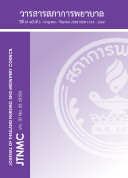Experiences of Caregivers of Critically Ill Pediatric Patients in End-of-Life Stage: A Phenomenological Study
Keywords:
experiences of family caregivers, families of critically ill pediatric patients, pediatric patients in their end-of-life stage, phenomenological studyAbstract
Objective: To describe and explain the experiences of family caregivers caring for their critically ill children in their end-of-life stage in a pediatric intensive care unit
Design: Phenomenological study
Methodology: The participants, who were purposively sampled, were 11 parents and chief caregivers of critically ill infants and children with life threatening illnesses or in their end-of-life stage treated in a campus hospital. Data were collected one or two times from each participant, through in-depth individual interviews, non-participatory observation, and field note recording. The data were qualitatively analysed using van Manen’s method. Data reliability was established based on Lincoln and Guba’s criteria.
Results: The experiences of family caregivers caring for their critically ill children in their end-of-life stage were described as belonging to 12 themes classified into van Manen’s four ‘worlds’. First, the ‘lived body’ refers to uncertainty and bittersweet conditions in life, sufferings, stress, heartbreak, and need for strength. Second, the ‘lived time’ is marked by waiting for a miraculous healing, refusing to wish a quick death (in order to fulfill one’s desires), and coming to terms with losses. Third, the ‘lived relations’ refer to moral support from the life partner, assistance from the family, and caregiving from the nurses and physicians. Finally, the ‘lived space’ means flexibility for engaging family members to provide caregiving and help cope with loneliness.
Recommendations: For nurses and other healthcare professionals caring for critically ill children in their end-of-life stage, this study could provide a better understanding of family caregivers caring for their critically ill children, as well as preliminary information for the development of a caregiving model for this group of pediatric patients in line with the Thai social context.
Downloads
References
Chivanon N, Wacharansin C, Kampang P. Suffering of the mothers with low birth weight infants hospitalized in sick newborn care unit. Nursing Journal of The Ministry of Public Health. 2019;29(2):102-15. (in Thai)
Lamiani G, Giannin A, Fossati I, Prandi E, Vegni E. Parental experience of end-of life care in the pediatric intensive care unit. Edizioni mierva medica. 2013; 27(12):1334-43.
National Health Security Office. NHSO Annual Report 2020. Bangkok: Sangjanprinting; 2021 [cited 2021 October 1]. Available from: https://www.nhso.go.th/operating_results/47.
Piyasil W, Ningsanon W. Pediatric palliative care. Bangkok: Pentagon; 2013. (in Thai)
Verberne LM, Kars MC, Meeteren AYNS-v, Bergh EMMvd, Bosman DK, Colenbrander DA, et al. Parental experiences and coping strategies when caring for a child receiving paediatric palliative care: a qualitative study. Eur J Pediatr. 2019;178(7):1075-85.
World Health Organization. Palliative care 2020 [cited 2021 October 1]. Available from: https:// www.who.int/news-room/fact-sheets/detail/ palliative-care.
Tiyawistsri C, Hamtanon P, Limkamontip S. Nurse’s roles in neonatal palliative care. Journal of Health and Nursing Research. 2019;35(2):1-12. (in Thai)
Intharo W, Punthmathrith B, Wiroonpanich W. Needs, need responses, and need response satisfaction in palliative care among mothers of premature infants with life-threatening illness. Songklanagarind Journal of Nursing. 2019;39(4):26-39. (in Thai)
Daroonratsamee S, Mesukko J, Niyomkar S. Anticipatory grief and coping among parents with children transitioning into palliative care in critical care units. Nursing Journal 2020;47(3):14-26. (in Thai)
Bogetz JF, Ullrich CK, Berry JG. Pediatric hospital care for children with life-threatening illness and the role of palliative care. Pediatr Clin N Am. 2014;61: 719–33
Kunsongkeit W. Good death as perceived by the critically ill patients’ family members. Journal of Faculty of Nursing Burapha University. 2016;4:89-100. (in Thai)
Janet E. Rennick, Isabelle St-Sauveur, Alyssa M. Knox, Margaret Ruddy. Exploring the experiences of parent caregivers of children with chronic medical complexity during pediatric intensive care unit hospitalization: an interpretive descriptive study. BMJ Pediatra. 2019;19(272):1-10.
Poompan P, Fongkaew W, Mesukko J, Niyomkar S. End-of-life care for children and families in pediatric intensive care: Thai nurses’ perspectives. Pacific Rim Int J Nurs Res. 2020;24(3):335-48. (in Thai)
Brosig C, Pierucci R, Kupst M, Leuthner S. Infant end- of- life care: the parents’ perspective. J Perinatol. 2007;27(8):510-6.
Lincoln YS, Guba EG. Naturalistic inquiry. Beverly Hills,CA: Sage; 1985.
van Manen M. Phenomenology of practice: meaning-giving methods in phenomenological research and writing. New York: Left Coast Press; 2014.
van Manen M. Research lived experience: human science for an action sensitive pedagogy. New York, NY: State University of New York Press; 1990.
Mishel MH. Uncertainty in illness. Image J Nurs Sch. 1988;20(4):225-32.
Petchlek P, Teerarungsikul N, Sanareangsak S. The effect of informational and emotional support program on uncertainty in illness among mothers having children with intubation. Princess of Naradhiwas university Journal. 2019;11(2):23-34. (in Thai)
Punaglom N, Tangvoraphonkchai J, Mangkarakeree N, Sereethummapituk B. The development of caring model for grief parent from losing a child. Journal of Nursing Science and Health. 2018;41(1):105-16. (in Thai)
Thamanee G, Patoomwan A, Phengjard J. Palliative care needs of children with cancer and their families as perceived by family caregivers. Rama Nurs J. 2018;24(3):295-312. (in Thai)
Punna A, Teerarungsikul N, Sanareangsak S. The effect of information and husband support program on uncertainty of mothers with preterm infants. The Journal of Faculty of Nursing Burapha University. 2019;27(4): 1-9. (in Thai)
Vattanaprasan P, Kongsuwan W, Nilmanat K. The lived experiences of Thai buddhist family members in decision making for withholding or withdrawing life sustaining treatments for critically ill patients in terminal stage. Songklanagarind Journal of Nursing. 2019;39(4):52-63. (in Thai)
Branchett K, Stretton J. Neonatal palliative and end of life care: what parents want from professionals. J Neonatal Nurs. 2012;18:40–4.
Downloads
Published
How to Cite
Issue
Section
License
Copyright (c) 2022 Thai Journal of Nursing Council

This work is licensed under a Creative Commons Attribution-NonCommercial-NoDerivatives 4.0 International License.








